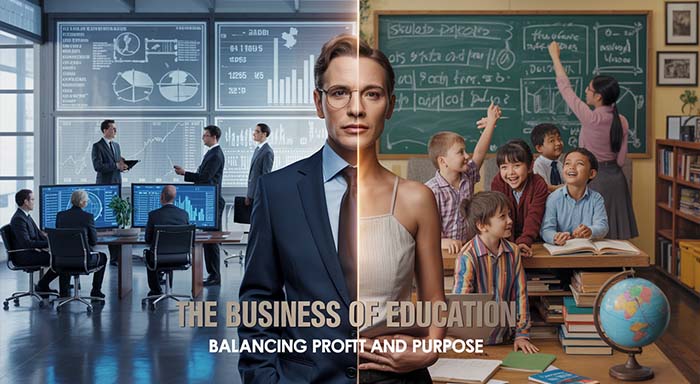Education has progressed beyond the confines of the classic classroom. Today, it is one of the globe's biggest and most intricate industries, raking in trillions of dollars across the world
Education has progressed beyond the confines of the classic classroom. Today, it is one of the globe's biggest and most intricate industries, raking in trillions of dollars across the world while defining the future of human civilization. Knowledge of the education business involves understanding how learning shifted from a public service to a complex marketplace where profitability, accessibility, and innovation meet.
The Education Economy Scale
The education market worldwide is mind-boggling in size. From kindergarten to higher education, professional training, and lifelong learning, the sector includes public schools, private schools, universities, online learning sites, edtech companies, and training institutions. Education budgets alone in the United States are over $800 billion annually, and the international market measures at over $6 trillion.
This huge economic presence is a testament to the foundational role of education in society. Education produces human capital—the skills, abilities, and knowledge that stimulate economic growth and social advancement—differing from conventional businesses that sell goods or services. This distinction positions education as a business venture as well as a social obligation.
The Redefinition of Learning Models
The education business has been revolutionized over the last several decades. Conventional models based on bricks-and-mortar institutions with standardized courses are being replaced by adaptive, individualized learning opportunities. Online education platforms such as Coursera, Udemy, and Khan Academy have leveled the playing field by opening up access to knowledge for anyone with an internet connection to receive instruction from first-rate teachers.
This transformation has spawned new business models altogether. Subscription learning platforms bring in steady revenue while offering persistent value to learners. Micro-learning mobile apps provide bite-sized learning content to professionals with busy schedules. Corporate training has turned into billion-dollar industries as companies spend money on upskilling their employees.
These shifts gained momentum in a dramatic way because of the COVID-19 pandemic. Remote study became the new standard overnight, showing that education can be transmitted efficiently via digital means. This forced adaptation opened up both the promise and the limitations of edtech, paving the way for blended models that combine online convenience with face-to-face interaction.
The Revolution in EdTech
Education technology is among the most rapidly expanding segments of the education market. Venture capital funding of EdTech start-ups has skyrocketed, with billions of dollars invested in firms creating artificial intelligence tutors, virtual reality schools, and adaptive learning algorithms.
The opportunity for business is huge. PW in India and Coursera in U.S. are billion-dollar organizations that have done this by leveraging technology for scaling the delivery of learning. They have the ability to reach millions of students simultaneously and create economies of scale that traditional institutions can never match.
The Economics of Higher Education
Higher education is a symbol of the complex economics of the education sector. The university is a multi-purpose organization with a blend of instruction, research, students affairs, and at times healthcare and athletics. They generate revenues from charging tuition fees, government appropriations, research grants, endowments, and auxiliary businesses.
The higher education business model is in deep trouble. For years, costs have risen in step with inflation, creating affordability crises across many countries. Levels of student loans are at a record high, calling into question the value for money of the conventional degree. Simultaneously, alternative credentialing systems like professional certificates and boot camps deliver faster, more targeted acquisition of skills at lower costs. Universities are responding to this by stretching out their offerings. Executive education programs, online degrees, and corporate partnerships bring new revenue streams.
Corporate Training and Professional Development
A sizable and expanding sector of the education market is corporate learning. Every year, businesses all over the world spend more than $350 billion on staff training and professional development. The investment attests to the truth that skills become obsolete rapidly in the rapidly changing economy of today.
Corporate training has expanded from off-the-shelf, mass-produced seminars to highly sophisticated, data-fueled learning environments. Corporate businesses like LinkedIn Learning, Pluralsight, and Coursera for Business provide inclusive platforms that track employee learning, identify skill gaps, and offer targeted content. Similar to hospitality job boards that connect skilled professionals with industry opportunities, these platforms bridge the gap between learning and real-world application.
The business model here is particularly attractive because companies have a high incentive to invest in training that boosts productivity and retention. Compared to single-shot customers who may not want to pay for schooling, companies view training as a necessary operational cost that can be measured as a payoff.
The Public vs. Private Role in Education
The education industry is located in a special environment in which both the public and private sectors exist together and compete with each other. Public school systems, supported by taxpayers, offer free or low-cost education as a public good. Private schools and businesses run for profits by providing high-end services or specialized courses.
This double structure engenders complicated dynamics. Public institutions tend to have limited budgets and bureaucratic constraints, whereas private firms can act fast and experiment at will. Private schooling can, however, perpetuate inequality if high-quality education is reserved for paying few.
The most successful learning ecosystems learn to take advantage of both sectors. Public-private partnerships can merge government money with the efficiency of the private sector. Open-source educational materials enable private firms to innovate on top of public investments in curriculum content.
Challenges and Opportunities
The education business has a number of significant challenges. Ensuring quality continues to be challenging as the sector grows quickly in scale. With millions of online courses and programs, it becomes more difficult to differentiate useful education from product-oriented content.
Credentialing is another pertinent issue. Conventional degrees and certificates are often not able to capture the skills required by fast-changing job markets. Alternative credentialing models such as digital badges and competency-based measures are being developed, but both institutions and employers are yet to adjust to these new models.
Equity and access issues still exist as the sector goes commercial. Technology can democratize learning, yet it can also introduce new inequalities founded on digital access, technological skills, and cost. These inequalities must be addressed by careful policy responses and business models that are keen on inclusion.
The Future of Educational Business Models
In the future, the education business will increasingly diversify and specialize. Artificial intelligence will provide unprecedented personalization, with highly customized learning experiences that adjust in real-time to the needs and pace of each individual learner.
Blockchain can transform credentialing by providing safe, verifiable records of learning achievements that accompany learners through their careers. Virtual and augmented reality will bring experiential learning mainstream, especially in areas that are improved with hands-on experience.
The subscription economy will expand, with students paying for a subscription for ongoing access to revised content as opposed to single courses. Micro-credentials and just-in-time learning will also gain more prominence as change continues to speed up.
Conclusion
The business of education represents a transformative force in our global economy. This trillion-dollar industry balances commercial success with societal impact, creating human capital that drives progress. As technology reshapes learning through AI, blockchain, and immersive experiences, the future demands organizations that prioritize authentic educational value over profit alone. Success requires sustainable business models that ensure accessibility while fostering innovation.
Respond to this article with emojis

















